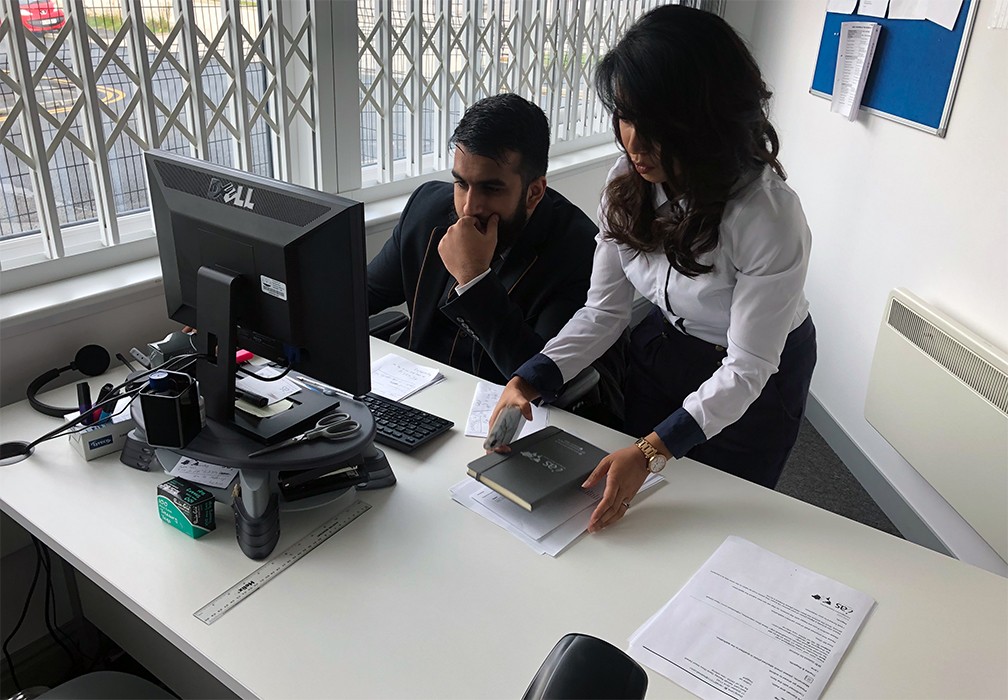Irish Citizenship Refusal Reasons
There are many reasons as to why Irish Immigration Service Delivery may refuse your application for Irish citizenship.
For more information about the Irish citizenship process, or for further help and assistance if your application has been refused, don’t hesitate to get in touch with one of our trusted legal advisers on +353 (0) 61 518 025, or contact us online.
Why Might My Application for Irish Citizenship be Refused?
In order to be eligible for Irish citizenship, you must comply with the requirements set out by the Irish Nationality and Citizenship Act and the Irish Minister for Justice.
If the Minister for Justice decides that you’ve not met these requirements, your application for Irish citizenship may be refused.
The most common reasons for refusal include the following:
- If you don’t fulfil the ‘good character’ requirement
- If you don’t fulfil the continuous reckonable residency requirement
- If you don’t provide compelling enough evidence for your citizenship case
In addition, your application may also be refused if there were administrative issues during the application process, such as if you didn’t supply the right documents, or pay the right fees.
If you require any additional assistance with ensuring your Irish citizenship application will be accepted, speak to one of our trusted legal advisers on +353 (0) 61 518 025, or contact us online today.
Page Contents
- Why Might My Application for Irish Citizenship be Refused?
- What Are the Eligibility Requirements for Irish Citizenship?
- Why Might My Application for Irish Citizenship Be Refused on Character Grounds?
- Why Might My Application for Irish Citizenship Be Refused Based on Reckonable Residence?
- Why Might My Application for Irish Citizenship Be Refused Based on Lack of Compelling Evidence?
- What Are Other Reasons My Application for Irish Citizenship Might Be Refused?
- Is It Possible to Appeal Irish Citizenship Application Refusals?
- How Can Total Law Help?
Why Might My Application for Irish Citizenship Be Refused on Character Grounds?
Overview of The ‘Good Character’ Criteria
According to the Irish Department of Justice, failure to satisfy the ‘good character’ requirement is one of the most common reasons for refusal when people apply for Irish citizenship.
Reasons for the refusals can be wide-ranging, and can vary from individual case to case.
This is because the ‘good character’ requirement is made at the absolute discretion of the Minister for Justice, who ultimately has final say on the application approval or refusal process.
Why Have Citizenship Applications Been Refused, And For What Reasons?
According to some reports, applicants have been refused citizenship because of relatively minor offences.
For example, three applications have been refused in the past because the applicants had received parking fines or road traffic offences, despite these not being criminal convictions.
In addition to this, four applicants were previously refused as they had previously received social welfare payments from the State.
It may be that simply having a clean criminal record is not be enough to satisfy the ‘good character’ requirement of the citizenship application.
For instance, an applicant was denied citizenship as she’d come to the attention of the Garda when she appeared as a witness in a case, and not a criminal. In another case, a man faced refusal over an incident that involved driving without a licence despite having presented the required documentation to the Garda within the allotted time.
Cases of refusal such as these have left some feeling unsure about what the specific definition of ‘good character’ actually is.
How is ‘Good Character’ Defined?
Broadly speaking, to be of ‘good character’ may simply mean to be a law-abiding citizen. It has also been described as having to follow ‘reasonable standards of civic responsibility as gauged by reference to contemporary values’.
This is supported by the fact you are asked to provide the Minister for Justice certain information about your background to help process your citizenship application. These include:
- Your criminal record
- Driving offences you may have committed
- Any ongoing investigations against you
- Pending criminal cases (that haven’t been heard in court yet)
- Cautions or other warnings you have received from the Garda
- Certain civil cases (such as if you were subject to a barring order)
In addition to this, you are given the opportunity to explain the circumstances that led to the Garda or court action, such as explaining any extenuating circumstances that may apply to your situation. The Minister may also receive information from other government agencies and departments if they have information relevant to your citizenship application.
Any of these may influence the Minister for Justice’s decision to approve or refuse your application for citizenship on character grounds.
Issues of Ambiguity Regarding ‘Good Character’
Despite all of this, it’s important to note that the Irish Immigration Service does not provide any concrete definition or criteria for the term ‘good character’. It also doesn’t supply any guidelines on how it should be defined or interpreted.
As already mentioned, how the term is defined and interpreted is ultimately at the absolute discretion of the Minister for Justice.
This has led to cases where applicants have pointed to a lack of clarity, or felt that there’s an unfair ambiguity on what the criteria is to be of ‘good character’.
If you’re applying for Irish citizenship, it’s crucial that you’re aware of any barriers to citizenship you may encounter, as well as ensuring that you present the most compelling case for citizenship possible.
If you’re in doubt as to whether or not your citizenship application may be accepted, don’t hesitate to reach out to one of our legal experts today. Call us on +353 (0) 61 518 025, or contact us online for more information.
Why Might My Application for Irish Citizenship Be Refused Based on Reckonable Residence?
Overview of the ‘Reckonable Residence’ Criteria
Alongside the ‘good character’ requirement, not fulfilling the criteria for continuous, reckonable residence is one of the most common reasons why citizenship applications in Ireland are refused.
The specific guidelines state that all applicants must:
- Have a period of 365 days (1 year) continuous reckonable residence in the State immediately before the date of application for naturalisation, and
- During the 8 years before that, have had a total reckonable residence in the State of 1,460 days (4 years)
However, the specific meaning of the one year’s continuous, reckonable residence in the State has also led to ambiguity in the past.
Why Do Ambiguities Regarding the ‘Reckonable Residence’ Criteria Exist?
In 2019, a court ruling confirmed that the rule doesn’t actually require applicants to spend every single night on Irish soil for a year, as some interpretations of the rule would suggest.
Instead, a spokesperson from the Department of Justice stated that “it has long been recognised that many people may travel abroad for a holiday, or may have some unexpected or unavoidable reason to travel abroad…A period of up to six weeks for travel purposes outside of the State is currently permitted without impacting on the citizenship application.”
Despite this, the specific details of these exceptions have not yet been made into law, and may still cause ambiguity or uncertainty in the application approval process.
You may have have taken a holiday abroad or left Ireland for a short period of time because you thought you were able to do so without breaking your continuous residency. However, your citizenship application may still be refused because the exceptions mentioned aren’t set in stone and the Minister may argue that you have broken your continuous residency.
If you’re having difficulty recognising if you fulfil the residency requirement of your Irish citizenship application, it’s best to seek advice so you know where you stand when it comes to the review process. Speak to one of our legal advisors on +353 (0) 61 518 025, or contact us online today.
Why Might My Application for Irish Citizenship Be Refused Due to Lack of Compelling Evidence?
Overview of Irish Citizenship Through Ascent, and Waivers
If you’re looking to obtain citizenship through Irish associations by ascent, you may be eligible to have certain requirements waived, such as the requirement for continuous residency.
Association by ascent is when an applicant has Irish links through having siblings who are Irish citizens, or being a parent of an Irish citizen child.
However, the guidelines state that requirements may be waived only if there are ‘exceptional and compelling reasons’ to be considered.
However, similar to the ‘good character’ requirement, there aren’t any official definitions or guidelines of what ‘exceptional’ or ‘compelling’ evidence means.
In addition to this, what is considered to be ‘Irish association’ is unclear, and may be inconsistently applied across different citizenship application cases.
This has led to people being refused citizenship even if they’ve spent a significant portion of their lives in Ireland and who have Irish citizen siblings. The reasons for refusal given in these cases are that the evidence of Irish association is not ‘compelling’ enough.
Why Have Applications for Citizenship Been Refused in the Past?
People have previously been refused Irish citizenship because they haven’t been able to get certain requirements waived.
Despite the fact that these applicants have lived in Ireland for a significant portion of their lives, speak the Irish language and have Irish siblings, the Minister for Justice has stated that evidence such as this was not compelling enough to waive the continuous residency requirements, and therefore refused to grant citizenship.
In these cases, the Minister cast doubts on the strength of Irish association, despite the applicants arguing that the Irish link was clearly strong.
What ‘compelling and exceptional’ evidence mean is still unclear, which means that applicants should be aware of the potential for refusal if the Minister doesn’t consider citizenship cases to fit the criteria, such as in the example outlined above.
For more information about the options you may have to obtain Irish citizenship by association, and for expert advice on how to apply, reach out to our legal advisers today on +353 (0) 61 518 025, or contact us online.
What Are Other Reasons My Application for Irish Citizenship Might Be Refused?
Most of the other reasons why applications may be refused are to do with not complying with the regulations and criteria as set out in the eligibility criteria.
For instance, when applying for Irish citizenship, the guidelines state that you must:
- Use the correct (most recent) version of the application form
- Pay the application fee
- Complete the statutory declarations
- Submit all documents as listed in the form’s Guidance Note
Failing to do any of these may result in your application being refused.
If your application is missing any documents, you may be given up to 28 days to provide them. However, if you fail to do so, your application may also be refused.
In addition to this, the Minister may issue a refusal based on grounds of national security concerns, or if you provide false or misleading information on your application form.
Is It Possible to Appeal Irish Citizenship Application Refusals?
There is no formal appeals process in Ireland if you have your citizenship application refused.
However, you may submit an application for a judicial review in front of a court of appeal. This will investigate the Minister for Justice’s decision-making process behind the refusal, and whether or not all relevant considerations were taken into account when refusing your application.
Judicial reviews can sometimes lead to citizenship application refusals quashed or overturned by the High Court. This may occur if the court finds that the initial decision was unlawful, if the Minister was not fair and judicial, or if they didn’t consider all of the relevant material in a your application.
It’s important to remember that submitting a refused application for judicial review is by no means a guarantee that the initial refusal will be quashed or overturned.
If you’re considering submitting your citizenship application for a judicial review, don’t hesitate to reach out for expert advice and support from one of our immigration lawyers. Call us on +353 (0) 61 518 025, or contact us online today.
How Can Total Law Help?
Some of the eligibility criteria for Irish citizenship or Irish citizenship may be considered ambiguous, which may cause uncertainty for applicants. Even what you may think is a complete application may not be enough.
Luckily, Total Law is here to help. We will ensure you present the most complete, effective, and sound argument to the Minister for Justice so your chances of success are high.
We are expert immigration lawyers who can help guide you through every step of the Irish citizenship application process. We can help you determine eligibility, put together your application and supporting documents, and ensure that you have the best chance of getting your application approved. We can also liaise with the Immigration Service Delivery on your behalf.
In addition, if you have been refused Irish citizenship in a previous application, you can reach out to us to represent you if you wish to try again or go to a judicial review.
For more information about how we can help with your Irish citizenship case, don’t delay. Get in touch with us today at +353 (0) 61 518 025, or contact us through our form online.
You may be interested in reading about.
Advice Package
Comprehensive immigration advice tailored to your circumstances and goals.
Application Package
Designed to make your visa application as smooth and stress-free as possible.
Fast Track Package
Premium application service that ensures your visa application is submitted to meet your deadline.
Appeal Package
Ensure you have the greatest chance of a successful appeal. We will represent you in any case.

The Advice Package
During this untimed Advice Session with our professional immigration lawyers in London, you will receive our comprehensive advice, completely tailored to your needs and your situation.

The Application Package
With our Application Package, your dedicated immigration lawyer will advise you on your application process and eligibility. Your caseworker will then complete and submit your forms to the Home Office on your behalf.

The Fast Track Package
Our Fast-Track Application Package is a premium service for those who need to submit their application in time with their deadlines. Your case will become a top priority for our lawyers and you will benefit from our highest-quality services.

The Appeal Package
By choosing our Appeal Package, you can rely on our lawyers’ legal knowledge and experience to ensure you have the highest chance of a successful appeal. We will also fully represent you in any hearings/tribunals.
